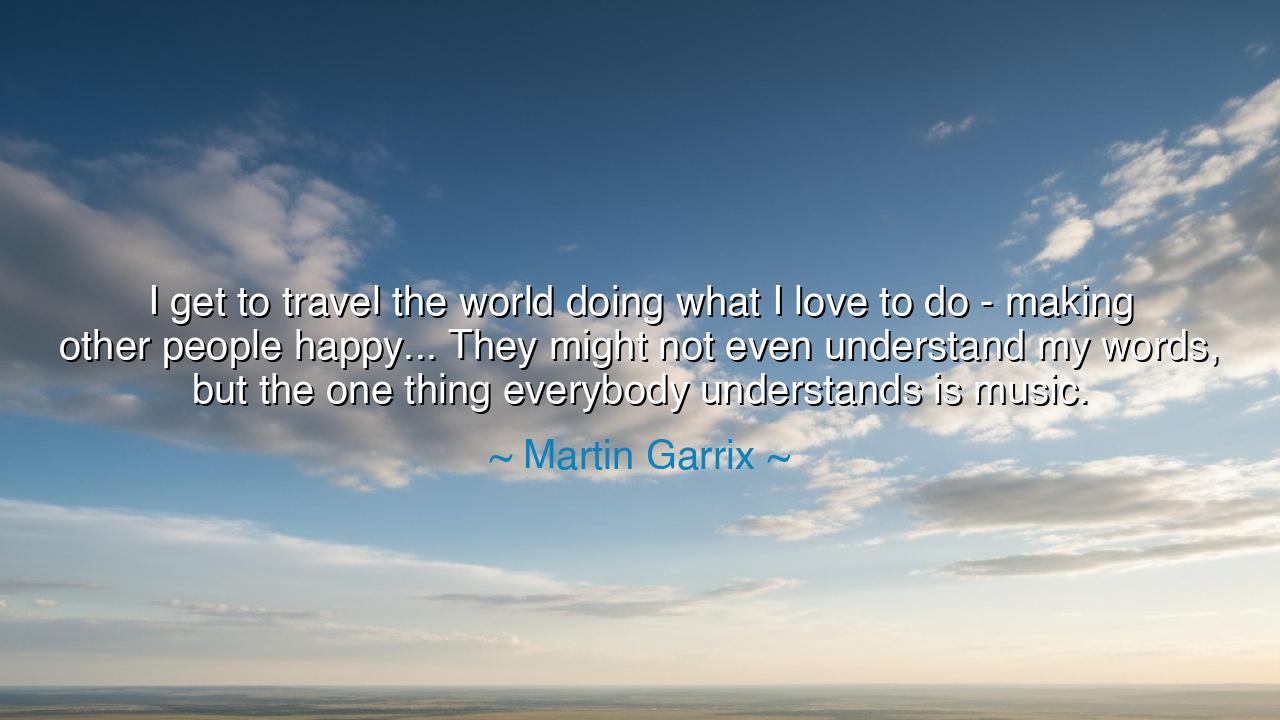
I get to travel the world doing what I love to do - making other
I get to travel the world doing what I love to do - making other people happy... They might not even understand my words, but the one thing everybody understands is music.






Martin Garrix, the young minstrel of our age, speaks with the fire of joy when he declares: “I get to travel the world doing what I love to do—making other people happy... They might not even understand my words, but the one thing everybody understands is music.” In this confession lies both humility and triumph, the recognition that the greatest gift is not only to live one’s passion, but to use it as a bridge between souls. He names the essence of art itself: to bind the hearts of strangers into kinship, not through speech, but through sound, rhythm, and harmony.
The first truth he shares is the blessing of travel. To walk across nations, to step upon stages in cities of every tongue, is not only movement of the body but expansion of the spirit. The wandering artist is heir to the ancient bards, who carried stories and songs from village to village, keeping memory alive and sowing joy across the land. Garrix’s journeys echo this tradition: like the minstrels of old, he crosses borders not with weapons or crowns, but with melodies that disarm, uplift, and unite.
He names his purpose plainly: to make others happy. This is no small task, for happiness is fleeting and fragile. Yet in music, it finds a vessel both simple and eternal. For when drums beat and strings sing, the burdens of life fall away, and the human spirit remembers its freedom. The singer and the listener share a sacred exchange: one gives, the other receives, yet in truth both are healed. Thus, Garrix reveals that the work of the artist is not selfish indulgence, but holy service—to bear joy into a weary world.
Then he acknowledges the barrier of words. In distant lands, his language may be strange, his tongue foreign. Yet he is not silenced, for music itself is older and greater than language. A melody needs no translation; a rhythm speaks directly to the pulse of the heart. The ancients knew this well: Pythagoras taught that music is harmony made audible, a reflection of the order of the cosmos. And so, when Garrix lifts his sounds into the air, he is not merely entertaining—he is reminding all who hear that beyond language, beyond nation, there is one shared understanding.
History gives us many witnesses to this truth. Consider Beethoven, who when struck deaf, could no longer hear the sound of his own compositions. Yet he wrote his Ninth Symphony, a work that continues to unite choirs and audiences across every continent. Though he himself could not hear, the world still does, and it speaks in a tongue understood by all—music. So too with Garrix: whether in Asia, Europe, or the Americas, his craft dissolves the barriers of speech and awakens the shared humanity that beats in every chest.
The lesson is radiant: pursue what you love, but pursue it not only for yourself. Let your gift serve others, and in serving, it will become greater than you. Know also that when words fail, when differences divide, there is always a deeper language—of kindness, of beauty, of song—that can unite what speech cannot. In this way, music is not only a profession; it is a path of peace.
Practical counsel follows: if you are an artist, create boldly, not fearing whether all will understand your words, but trusting that your spirit will speak beyond them. If you are not a musician, still remember: there are languages of the heart that need no words—smiles, gestures, acts of kindness. Practice them, for they are as universal as music. And when you encounter others whose tongue is not your own, seek the rhythm that unites you, not the differences that divide.
Thus, the wisdom of Garrix’s saying becomes clear: the world is wide, languages are many, but the heart is one. To travel with your gift, to bring happiness, to transcend words, and to speak through music—this is to live not only as an artist, but as a servant of humanity. And those who do so will not merely be remembered—they will be understood by every soul, in every land, until the end of time.






AAdministratorAdministrator
Welcome, honored guests. Please leave a comment, we will respond soon